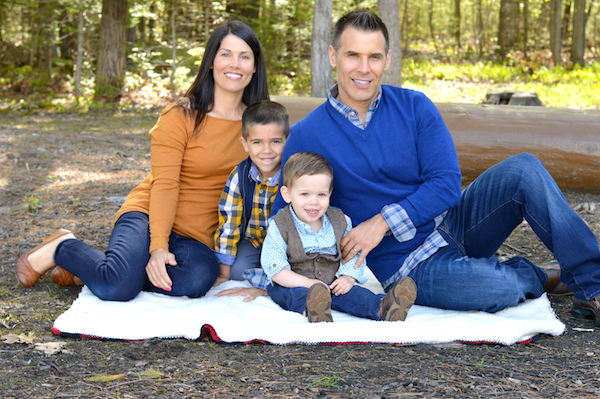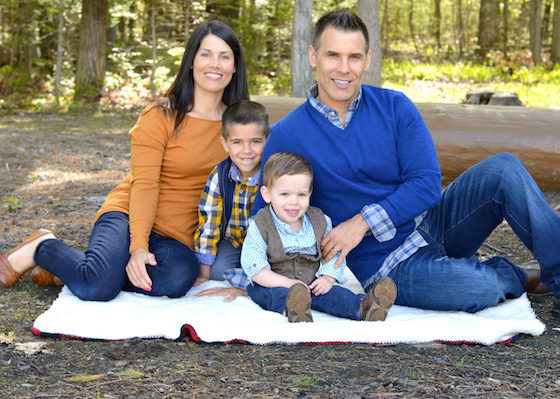It’s an incredible commitment to be a coach, and for most people, it’s not their full-time day job. These individuals give up their personal time to work with athletes; to help them become better at their sport, become better teammates, and more importantly, make sure they have fun. A coach has a special gift, and that is seeing what their athletes can become, to motivate their players and lead them by example.
Coaches, in most cases, serve as an extended family member. When we see our coaches on the sidelines with our children, we forget that they are someone’s husband or wife, or a little one’s mom or dad. We don’t think about what the coach is giving up. What do the families really feel about their loved one coaching and the time commitment it involves?
Jason Tanguay, a math teacher at Gorham High School, has been coaching in some capacity since he began teaching at GHS in 2004. In the beginning, Tanguay helped out with the boys soccer team but is now the coach of the cross country and indoor/outdoor track & field teams. Tanguay started coaching long before he had a family, and his wife Deb shared, “Coaching has just been a part of Jason’s life for so long; we accept it as a part of all of our lives, three (or even four) seasons each year.”
When you hear three or four seasons a year, it seems as though it must be difficult to balance family life with a coaching schedule. Deb said, “There are long days and often commitments on the weekends that take him away from the family. When he comes through the door, everyone wants his attention.” Jason shared that he and his wife have numerous conversations about the family schedule, sharing, “It is definitely an amazing juggling act!”
Jason believes he’s one of the luckiest people he knows. “My wife and two kids are a valuable part of the cross country and track & field program here in Gorham. If you attend our events, you will often see my family integrated amongst the athletes and coaches,” he said.

Deb feels the same. “Watching Jason interact with his athletes is wonderful. He helps his athletes, especially those who have struggled, set and accomplish goals. He gets to know them and their families, often over the course of four years.” She said her husband “thinks outside of the box”; sharing that he organizes workouts such as a scavenger hunt involving superhero capes, a practice with water balloons, a meet with a dance off, or a team dinner with karaoke and quirky games, just because.
Deb and the kids, along with their noisemakers, try to attend a few meets each season. She connects with the feelings of the distance runners as they cheer them on. Their children also enjoy occasional team dinners, especially happy when meatballs and chocolate milk are served.
Aside from attending meets, the athletes and their accomplishments are topics of conversation at the Tanguay dinner table. Then there are times when Deb says they try to “give Dad space” on the weekend when he needs to do computer entries or analyze meet results.
Jason was named the SMAA cross country Coach of the Year in 2017, but Deb said they didn’t need a plaque to tell them that. She said, “Honestly, one of the best things is when a parent, fellow coach, or former athlete comes to me and praises Jason for all that he does and how he has chosen to coach. He is passionate about his sports but, more importantly, he is compassionate toward his athletes.” She proudly went on, “He knows, firsthand, the power of being on a team and how this can strongly affect one’s path in life. He will pull for the underprivileged kid to join his team, buying shoes or other gear if necessary. He is never afraid to put in the extra amount of work.”
And as far as bring a coach’s spouse, Deb shared, “It’s busy, but the pros definitely outweigh any cons. Having our kids run across a field and find Dad for a high five or hug at a meet – there’s nothing like it! Little by little they are learning what true character is.”
Becky Manson-Rioux, a Physical Education and Health Teacher at GHS, is in her 17th season as coach of the GHS varsity field hockey team. She has also coached softball at GHS and Bonny Eagle over the years. Manson-Rioux started coaching right out of college, working her way into a teaching position.
Becky’s husband Kelly and their two boys are on board with her coaching, saying, “It has become simply something that we do.” While he revealed that the biggest sacrifice of being a coach’s spouse is missing out on family time, Kelly loves seeing Becky’s hard work pay off. With his wife working the extra hours, Kelly also shared that he enjoys the time he spends with his boys. “It’s time consuming but it’s worth it.”

Becky said her children and husband always show an interest in every new team and how they are doing. They attend a few games over each season, and also attend weekly team dinners and Saturday field hockey sessions.
Connections between coaches’ families and players are formed and can become that of an extended family. Kelly shared that Charlotte Smith (GHS ’15) and Isis Adams (GHS ’19), both field hockey alum, babysat for their boys. “It has been very special to our family to have someone we know and trust in our home,” he said.
Coaches’ impacts on athletes are so much more than just the game, they can influence personal lives and goals. Manson-Rioux has a strong desire to make a difference in the lives of the young women she coaches.
“Balancing my teaching and coaching career along with family time is not always easy. It takes planning and teamwork from everyone involved,” she said. “Each season I find myself missing my family as I pursue my passion and dreams. So I hope in the future my children understand it is okay to put themselves first when it comes to their passion and dreams as long as there is a balance.”
Being a coach isn’t a job, it’s a calling. And while it’s not without obstacles for families, the pros overwhelmingly seem to outweigh the cons. When you’re at the next game or meet cheering on your child and their team, take a look on the sidelines and remember what the coach may be sacrificing to be there. Whether it’s time with their family or their own children’s sporting event; something has to give and it takes the support of their entire family to commit to being a coach.


